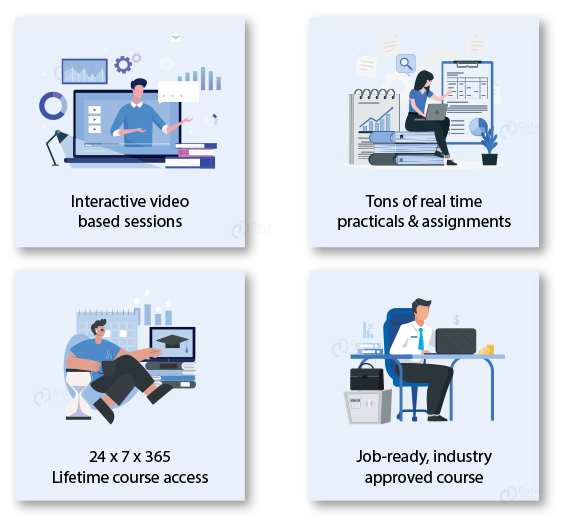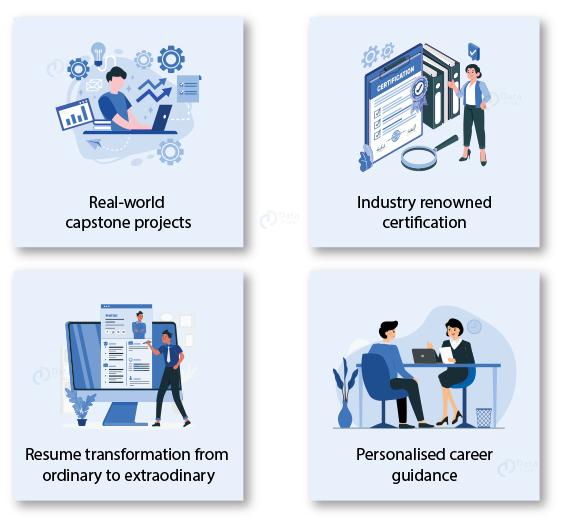Free R Programming Certification Course

Join our R programming course to gain the expertise as well as skills to visualize, manipulate and handle data in a much better way. Our comprehensive course covers everything from basics, till advanced concepts which will ensure that your fundamentals are strong.
What will you take home from this Free R Course?
- 45+ hrs of Self-paced video course
- 170+ hrs of study material, practicals, quizzes
- Acquire practical knowledge which industry needs
- Practical R course with real-time case-studies
- Lifetime access with industry renowned certification
Why should you enroll in this Free R course?
- Gain relevant knowledge and skills from industry level experts
- Get access to a diverse syllabus covering all concepts, from basics to advanced
- Upgrade your current skill set by learning R
- On successful completion of this R course, you will receive a career-boosting certificate
- Get guidance and mentorship from industry level experts
- Gain the skills needed to crack coding interviews and gain your next job as a Data Analyst or Machine Learning engineer
- Gain hands on experience by applying your skills in real-life examples
- Master one of the most used language in the field of Data Analysis, Data Science and Machine Learning
- Get an opportunity to connect with other individuals interested in R programming
- Stay updated with the current advancements in AI, Data Science and Machine Learning
- Increase your chances of getting a job as a Data Analyst
- Utilize the advantage of learning at your own pace as well as life-time access to the course
R Course Objectives
Welcome to this comprehensive course in R Programming by DataFlair. This course is designed to help you in developing strong fundamentals in the R programming language. Secure your next job as a Data Analyst, Data Scientist or Machine Learning engineer by learning R programming. The skills obtained from this course will definitely help you in your personal as well as professional growth.
The course starts off by covering the basics of R Programming like variables, data types, loops, decision making statements, functions etc. It then progresses to much more advanced topics like coding machine learning algorithms in R. This is a self paced course, which lets you learn at your own preferred pace and comfort.
Our R programming course is designed to provide you a comprehensive understanding of the fundamentals of R. This R course is designed in such a way that it suits learners of all levels, whether beginners in the field of coding or someone who has had some experience in coding. A course which consists of mere theory often fails to retain the students attention. In order to avoid this problem, we have included assignments, tests and projects which will help the students gain hands-on experience in R programming and apply the skills that they have learned, to solve real-life scenarios and case-studies.
During your journey of learning R programming, you might encounter problems or challenges, fear not! We have a dedicated team of industry level experts who will be more than happy to resolve all your queries and help you out in your journey. We understand that learning is a dynamic process and hence, we are committed to ensure that you don’t face any difficulties during your learning process. Our mentors and instructors are fully dedicated to ensure that you will succeed in this R programming course.
After successful completion of this R course, you will be awarded with a course completion certificate from DataFlair. This certificate will hold a great value and it will be of great advantage as you make progress in your professional journey, in the field of R programming. Apart from this, you will have lifetime access to the course materials. If at any point further, you wish to revisit the course materials to brush up your concepts, just head back to our website, login to your account and you can have a look at the course material.
Why should you learn R?
- R Programming is frequently used in leading industries like Healthcare, Fintech and Research etc
- It is helpful for individuals who wish to gain a job as a Data Scientist or Data Analyst jobs in reputed organizations
- R contains a large amount of libraries and packages which can be used for a variety of purposes
- R is platform compatible, which means that it can run on any operating system
- Twitter uses R programming language for statistical analysis, Google uses R to compute its returns and revenues from various ad campaigns
- Solid understanding of usage of R in Data Analysis, Machine Learning etc
What is R?
Developed in the early 1990s by Ross Ihaka and Robert Gentleman at the University of Auckland, New Zealand R is a popular open-source programming language which is most often used for purposes like statistical computing, data analysis and data visualization. R provides programmers with a wide variety of tools and libraries using which programmers can analyze, handle, manipulate and visualize data in a much easier and more efficient way. R consists of several built in functions and packages which helps the user perform operations like data cleaning, data transformation etc. Due to all these factors R is often used by Data Analysts, Data Scientists and Machine Learning engineers.One of the key strengths of R is its ability to visualize data. R allows programmers to create high quality visually appealing plots, graphs and charts, thus representing data in a better format. The flexibility of R, to run on any operating system like Windows, MacOS, Linux etc is another reason why it is preferred by so many people. It also integrates well with other programming languages and tools, thus making it a go-to language for professionals dealing with data. Since R is a popularly used programming language, it has a huge community of users as well as developers. The community contributes to the development of new packages, libraries and features thus making it a thriving ecosystem for collaborative learning.What to do before you begin?
Nothing! All you need to make the most out of this free R course is a desire to learn and a penchant for solving problems Additionally, a strong motivation for problem solving will greatly enhance the entire process of learning R programming language. Although not mandatory, some basic knowledge about statistics will be helpful during the process of Data Analysis using R language. Basic understanding of Mathematical concepts like Algebra, Graphs will be an added advantage.Who should go for this free R course?
If you’re an aspiring Data Science enthusiast and you wish to learn R, then this course is an absolute must for you. This course provides a rock solid foundation in the fundamental concepts of programming and especially R programming in particular. In case individuals are Data Analysts or wish to get hired as a Data Analyst in a reputed organization, this R course will help you enhance your data visualization, and data handling skills. You will be taught how to make use of the concepts of R in order to handle, process and analyze large datasets. Data Scientists who wish to excel in their career must definitely take this course. This course will teach you skills like advanced data manipulation, machine learning, statistical modeling etc using R. The following people must go through this training –- Coding enthusiasts who wish to learn R programming from scratch
- Individuals who are looking forward to expanding their skill set and gaining proficiency in R for Data Analysis, Data Science etc.
- Data Scientists who wish to advance in their professional career by improving their data manipulation, data handling and data visualization skills by learning R
- Individuals who wish to get their next job as a Data Analyst, Data Scientist or Machine Learning engineer
- Researchers and academics who require strong data analysis and statistical modeling skills for their work.
By enrolling in our R course, you can expect the following benefits:
Enrolling in this R course will provide you an exposure to plentiful of opportunities like:- R programming is a skill which is in great demand in the industry, especially in the field of Data Analysis, Data Science, Research and Machine Learning. By enrolling and completing this R course, you will gain highly valuable skills. These skills will definitely help you crack your next interview for positions like Data Analyst, Data Scientist or a Machine Learning engineer.
- This R course has been designed and developed by industry level experts in R programming. This R course will provide you with projects, tests and assignments which will have a significance in the real world. It will enable you to apply your skills and eventually solve real-life problems or case studies.
- By joining this R course, you will also get the opportunity to interact with a massive community of learners who have taken up the same course, professionals and mentors. Engaging with fellow students and mentors will help you to learn from diverse perspectives, gain resourceful insights and enable you to expand your professional network.
- Fundamentals of R programming like variables, data types, loops, operators etc
- Techniques for data manipulation, filtering data, handling data
- Statistical analysis in R, hypothesis testing, regression modeling etc
- Importing datasets in R, merging datasets, filtering datasets and sorting datasets
- Handling missing data, dealing with outliers and visualizing data
- Advanced topics like Machine Learning, data mining, predictive modeling
- Real world applications of R programming through projects, assignments and tests
Jobs after Learning this R Course
R Programming is a highly in-demand skill in the industry and people who learn R programming have a variety of job options to choose from. R Programming has its usage in leading industries like healthcare, fintech, research etc. Some of the most popular jobs which require skilled R programmers are Data Scientists, Data Analysts and Statisticians. Data Scientists are one of the most common people who learn R programming language. Although Python is widely used in the field of Data Science, people like to stay updated with the technology and thus develop their interest to learn a new programming language. The interesting features provided by R, fuels their interest to learn the programming language. Data Analysts use R programming to gain and derive insights from large datasets. R is also used to perform statistical analysis, regression modeling etc and help in taking data driven decisions. Job Roles after Learning R:- R programmer: He is responsible for creating tools using various data structure like vectors, matrices etc to ease the process of data analysis
- Data Scientist: His role is to design and implement layouts for large data sets, data mining, prediction etc.
- Data Analyst: His job is to combine his technical and analytical knowledge to handle complex data sets to provide insights that help the company in making business decisions.
- Data Architect: His job is to integrate and maintain data sources using latest technologies like spark.
- Data Visualization Analyst: His job is to create and distribute interactive dashboards that gives information to make major business decisions.
- Geo Statisticians: These are responsible for examining spatial and spatiotemporal datasets.
- Statisticians: Responsible for closely examining data and discover hidden patterns.
- Quantitative Analysis with R: He helps in finding new opportunities and evaluating all asset prices using mathematical models.
- Data Analytics: Responsible for advanced analytics and implementation of various ml algorithms to explore data and generate insights like predictive analytics.
Our students are working in leading organizations

Online R Free Training Course Curriculum
- Install R and R studio for Windows and Mac
- Types of Variables
- Using Variables
- Logical Variables and Operators
- The “While” Loop
- Using the console
- The “For” Loop
- The “If” statement
- What is a Vector?
- Creating Vectors
- Using the [] brackets
- Vectorized Operations
- The power of vectorized operations
- Functions in R
- Packages in R
- Matrices
- Building Your First Matrix
- Naming Dimensions
- Colnames() and Rownames()
- Matrix Operations
- Visualizing With Matplot()
- Subsetting
- Visualizing Subsets
- Creating Your First Function
- Importing data into R
- Exploring your dataset
- Using the $ sign
- Basic operations with a Data Frame
- Filtering a Data Frame
- Introduction to qplot
- Visualizing with qplot
- Building Dataframes
- Merging Data Frames
- What is a Factor?
- Aesthetics
- Plotting With Layers
- Overriding Aesthetics
- Mapping vs Setting
- Histograms and Density Charts
- Starting Layer Tips
- Statistical Transformations
- Using Facets
- Coordinates
- Perfecting By Adding Themes
Features of R Free Course


